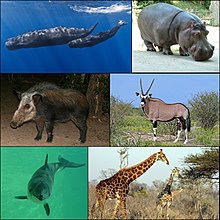Artiofabula is a clade made up of the Suina and the Cetruminantia.[1] The clade was found in molecular phylogenetic analyses and contradicted traditional relationships based on morphological analyses.[1][2]
| Artiofabula Temporal range: Early Eocene to present
| |
|---|---|

| |
| Some examples of Artiofabula | |
| Scientific classification | |
| Domain: | Eukaryota |
| Kingdom: | Animalia |
| Phylum: | Chordata |
| Class: | Mammalia |
| Order: | Artiodactyla |
| Clade: | Artiofabula Waddell et al. 1999 |
| Subgroups | |
| Synonyms | |
|
Cetartiofabula | |
Etymology edit
The name Artiofabula was derived from Greek "artios" (meaning complete or perfect of its kind or, with respect to numbers, even), and Latin "fabula" (meaning fable). The latter referred to the clade breaking up traditional views on artiodactyl taxonomy based on morphological analyses, where camels grouped with ruminants, hippos with pigs, and whales were unrelated.[1]
Phylogeny edit
Phylogenetic analyses of artiodactyls revealed the following relationships:[2][3][4][5][6][7][8]
| Artiodactyla |
| ||||||||||||||||||||||||
Classification edit
- Order Artiodactyla (even-toed ungulates)
- Suborder Tylopoda (camelids)
- Artiofabula[1] (ruminants, pigs, peccaries, whales, and dolphins)
- Suborder Suina (pigs and peccaries)
- Family Suidae 19 species (pigs)
- Family Tayassuidae 4 species (peccaries)
- Cetruminantia[1] (ruminants, whales, and dolphins)
- Suborder Ruminantia (antelope, buffalo, cattle, goats, sheep, deer, giraffes, and chevrotains)
- Family Antilocapridae, 1 species (pronghorn)
- Family Bovidae, 135 species (antelope, bison, buffalo, cattle, goats, and sheep)
- Family Cervidae, 55 - 94 species (deer, elk, and moose)
- Family Giraffidae, 2 species (giraffes, okapis)
- Family Moschidae, 4 - 7 species (musk deer)
- Family Tragulidae, 6 - 10 species (chevrotains, or mouse deer)
- Suborder Whippomorpha[1] (aquatic or semi-aquatic even-toed ungulates)
- Infraorder Acodonta
- Family Hippopotamidae, 2 species (hippopotamuses)
- Infraorder Cetacea (whales, dolphins, and porpoises)[9][10][11]
- Parvorder Mysticeti (baleen whales)
- Family Balaenidae, 2 - 4 species (right whales and bowhead whales)
- Family Balaenopteridae, 6 - 9 species (rorquals)
- Family Eschrichtiidae, 1 species (gray whale)
- Family Neobalaenidae, 1 species (pygmy right whale)
- Parvorder Odontoceti (toothed whales, dolphins, and porpoises)
- Superfamily Delphinoidea (dolphins, arctic whales, porpoises, and relatives)
- Family Delphinidae, 38 species (dolphins, killer whales, and relatives)
- Family Monodontidae, 2 species (beluga and narwhal)
- Family Phocoenidae, 6 species (porpoises)
- Superfamily Physeteroidea (sperm whales)
- Family Kogiidae, 2 species (pygmy and dwarf sperm whales)
- Family Physeteridae, 1 species (common sperm whale)
- Superfamily Ziphoidea (beaked whales)
- Family Ziphidae, 22 species (modern beaked whales)
- Superfamily Platanistoidea (river dolphins)
- Family Platanistidae, 1 - 2 species (Asian river dolphin(s))
- Superfamily Inioidea
- Family Iniidae, 1 - 3 species (South American river dolphin(s))
- Family Pontoporiidae, 1 species (La Plata dolphin)
- Superfamily Lipotoidea
- Superfamily Delphinoidea (dolphins, arctic whales, porpoises, and relatives)
- Parvorder Mysticeti (baleen whales)
- Infraorder Acodonta
- Suborder Ruminantia (antelope, buffalo, cattle, goats, sheep, deer, giraffes, and chevrotains)
- Suborder Suina (pigs and peccaries)
References edit
- ^ a b c d e f Waddell, Peter J.; Okada, Norihiro; Hasegawa, Masami (1999). "Towards Resolving the Interordinal Relationships of Placental Mammals". Syst. Biol. 48 (1): 1–5. doi:10.1093/sysbio/48.1.1. PMID 12078634.
- ^ a b Gatesy, John; Milinkovitch, Michel; Waddell, Victor; Stanhope, Michael; Waddell, Peter (1999). "Stability of Cladistic Relationships between Cetacea and Higher-Level Artiodactyl Taxa". Systematic Biology. 48 (1): 6–20. doi:10.1080/106351599260409. ISSN 1076-836X. PMID 12078645.
- ^ Meredith, R. W.; Janecka, J. E.; Gatesy, J.; Ryder, O. A.; Fisher, C. A.; Teeling, E. C.; Goodbla, A.; Eizirik, E.; Simao, T. L. L.; Stadler, T.; Rabosky, D. L.; Honeycutt, R. L.; Flynn, J. J.; Ingram, C. M.; Steiner, C.; Williams, T. L.; Robinson, T. J.; Burk-Herrick, A.; Westerman, M.; Ayoub, N. A.; Springer, M. S.; Murphy, W. J. (2011). "Impacts of the Cretaceous Terrestrial Revolution and KPg Extinction on Mammal Diversification". Science. 334 (6055): 521–524. Bibcode:2011Sci...334..521M. doi:10.1126/science.1211028. ISSN 0036-8075. PMID 21940861. S2CID 38120449.
- ^ Beck, N.R. (2006). "A higher-level MRP supertree of placental mammals". BMC Evol Biol. 6: 93. doi:10.1186/1471-2148-6-93. PMC 1654192. PMID 17101039.
- ^ O'Leary, M.A.; Bloch, J.I.; Flynn, J.J.; Gaudin, T.J.; Giallombardo, A.; Giannini, N.P.; Goldberg, S.L.; Kraatz, B.P.; Luo, Z.-X.; Meng, J.; Ni, X.; Novacek, M.J.; Perini, F.A.; Randall, Z.S.; Rougier, G.W.; Sargis, E.J.; Silcox, M.T.; Simmons, N.B.; Spaulding, M.; Velazco, P.M.; Weksler, M.; Wible, J.R.; Cirranello, A.L. (2013). "The Placental Mammal Ancestor and the Post-K-Pg Radiation of Placentals". Science. 339 (6120): 662–667. Bibcode:2013Sci...339..662O. doi:10.1126/science.1229237. hdl:11336/7302. PMID 23393258. S2CID 206544776.
- ^ Song, S.; Liu, L.; Edwards, S.V.; Wu, S. (2012). "Resolving conflict in eutherian mammal phylogeny using phylogenomics and the multispecies coalescent model". Proceedings of the National Academy of Sciences. 109 (37): 14942–14947. Bibcode:2012PNAS..10914942S. doi:10.1073/pnas.1211733109. PMC 3443116. PMID 22930817.
- ^ dos Reis, M.; Inoue, J.; Hasegawa, M.; Asher, R.J.; Donoghue, P.C.J.; Yang, Z. (2012). "Phylogenomic datasets provide both precision and accuracy in estimating the timescale of placental mammal phylogeny". Proceedings of the Royal Society B: Biological Sciences. 279 (1742): 3491–3500. doi:10.1098/rspb.2012.0683. PMC 3396900. PMID 22628470.
- ^ Upham, N.S.; Esselstyn, J.A.; Jetz, W. (2019). "Inferring the mammal tree: Species-level sets of phylogenies for questions in ecology, evolution, and conservation". PLOS Biology. 17 (12): e3000494. doi:10.1371/journal.pbio.3000494. PMC 6892540. PMID 31800571.(see e.g. Fig S10)
- ^ Rice, D. W. (1 January 1998). Marine Mammals of the World: Systematics and Distribution (PDF). Society for Marine Mammalogy. pp. 92–95. ISBN 978-1-891276-03-3. OCLC 40622084.
- ^ Rice, Dale W. (2009). "Classification (Overall)". Encyclopedia of Marine Mammals (2nd ed.). Academic Press. pp. 234–238. doi:10.1016/B978-0-12-373553-9.00058-4. ISBN 9780123735539.
- ^ Committee on Taxonomy (May 2020). "List of marine mammal species and subspecies". Society for Marine Mammalogy. Retrieved 18 August 2020.